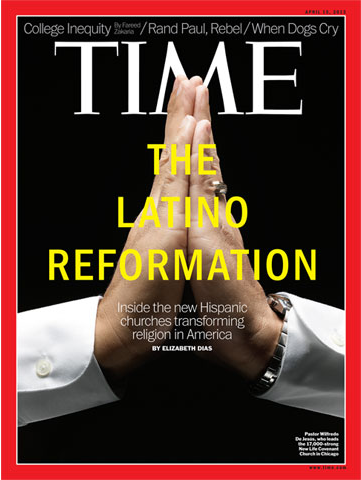
Last year I wrote a cover story for TIME called “The Latino Reformation” about the remarkable growth of Latino evangelical communities in the United States. At the time, very few organizations had been able to track the data behind the growth, and so I spent six months reporting out the shift. On Wednesday morning, the Pew Research Center released a new report on exactly this change, “The Shifting Religious Identity of Latinos in the United States.”
Pew’s findings are groundbreaking, but not surprising for anyone following the community closely. The 182-page report finds that nearly one-in-four Latinos in the U.S. are former Catholics. That is a much higher than the general U.S. Catholicism departure rate: only one-in-ten adults in the U.S. population as a whole have left Catholicism, according to a previous Pew study. In the last four years, the Catholic share of Latinos has dropped from 67% to 55%, while the evangelical share of Latinos has grown from 12% to 16%. The unaffiliated share of Latinos has grown even more, from 10% to 18%. Even as the Catholic share of Latinos is shrinking, the Latino share of Catholics in the country continues to rise as the Latino population in the U.S. continues to grow.
Latinos are joining Protestant churches, the report confirms, for socio-economic reason and not just religious ones. Half of Protestant converts say they left their childhood religion because evangelical churches reach out and help their members more. (Note: “Protestant” in most Latino communities tends to be synonymous with both evangelical and Pentecostal charismatic—Latino communities in the mainline Protestant churches are much smaller by comparison.) The social service priority of these congregations is significant draw. Evangelical Latino churches often act as a social safety network for their members, especially when it comes to basic needs like food, clothing, and health care.
Pentecostalism, and related “spirit-filled” movements, also continue to be highly popular in Latino communities. Hispanic Protestants have high personal experiences of divine healing, direct revelation from God, and witnessing spirits or the devil being driven out of someone. Even 52% of Hispanic Catholics describe themselves as charismatic.
The findings continue to support the theory that the GOP may have an opening in the Latino evangelical community. While Hispanics as a whole lean heavily Democrat, evangelical Latinos have the largest share who identify as Republican, and by almost 10 percentage points more than Latino Catholics. Latino evangelicals—regardless of party affiliation—also tend to be overwhelmingly conservative. More than two-thirds oppose gay marriage, compared to only a third of Catholic Latinos and just 16% of unaffiliated. They oppose abortion by similar margins, even though more Catholic and unaffiliated Latinos oppose abortion than do gay marriage. More than 60% of evangelical Latinos say that churches should expresses views of political and social issues, more than 12% higher than Catholic Latinos and 21% higher than the general public who believe the same.
The growth in the unaffiliated group that the report documents is also worth a deep dive. The divide between men and women here is particularly stark: 59% of unaffiliated Latinos are men, versus just 41% of women. Unaffiliated Latinos are growing most among young people. The growth in the last four years in that sector is up 17 points, far more than growth in other demographic groups in the survey. The biggest religious switching for U.S. born Latinos is movement into the unaffiliated group, with a net gain of 17%. Catholics, by contrast, have a net loss of 25% among the U.S. born.
The report also contains new data on Jehovah’s Witnesses, which represent just 1% of the U.S. adult population but 2% of the Hispanics, as well as Latino views of Pope Francis (predictably high approval), and specific religious practices of Latinos by country of origin. The full report is available at: http://www.pewforum.org/2014/05/07/the-shifting-religious-identity-of-latinos-in-the-united-states
More Must-Reads from TIME
- Donald Trump Is TIME's 2024 Person of the Year
- Why We Chose Trump as Person of the Year
- Is Intermittent Fasting Good or Bad for You?
- The 100 Must-Read Books of 2024
- The 20 Best Christmas TV Episodes
- Column: If Optimism Feels Ridiculous Now, Try Hope
- The Future of Climate Action Is Trade Policy
- Merle Bombardieri Is Helping People Make the Baby Decision
Contact us at letters@time.com